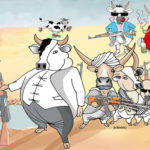The Food and Agriculture Organisation of the United Nations (FAO), in collaboration with the Federal Ministries of Agriculture and Rural Development, Health and Environment has launched the Africa Sustainable Livestock (ASL) 2050 report to develop the potentials and opportunities of the livestock sector in Nigeria.
ASL initiative is funded by the United States Agency for International Development (USAID), in six African countries.
The six African countries which include, Burkina Faso, Egypt, Ethiopia, Kenya, Nigeria and Uganda, presents what actions can be taken to ensure a sustainable development of the sector in the face of the expected rise in population, urbanisation and other factors.
N819m debt: Kogi govt dares Bello’s deputy to go to court
Speaking during the launch in Abuja, FAO country Representative, Suffyan Koroma , said the report which is tagged: “The Future of Livestock in Nigeria: Opportunities and Challenges in the face of Uncertainty,” looks out to 2050 and presents alternative scenarios that plausibly portray the future of the cattle and poultry sectors in Nigeria.
He noted that the report provides invaluable insights to decision makers on actions to make the Nigerian cattle and poultry more robust as well as resilient to an uncertain future and sustainable from a social, environmental and public health perspective.
He said the ASL 2050 in Nigeria has completed and generated evidence on description and mapping of cattle dairy and poultry production systems; assessment of the contribution of the cattle systems to household livelihoods; assessment of the impacts of the different production systems on the environment.
He further noted that the decision makers should consider the emerging challenges of increased risks in zoonotic disease spread and the importance of value chains serving urban and peri-urban areas.
His words: “Evidences indicate that population growth, urbanisation, industrialisation and rising incomes have already triggered growing demand for animal source foods in Nigeria foods in the country further causing major changes in livestock systems and value chains.
“Development and shifts in livestock systems, depending on the trajectories, will have both positive and negative impacts on society, particularly on public health, environment and people’s livelihood.
“The government of Nigeria, with support from FAO and USAID, engaged a multitude of stakeholders in a conversation around the foreseen and unforeseen of the future of cattle and poultry sectors in the country.
“Stakeholders did not predict or forecast with accuracy the future of the cattle and poultry sectors in Nigeria, but generated evidence on alternative, yet all credible and possible prospects, “ he added.
Speaking, the Permanent Secretary, Federal Ministry of Agriculture and Rural Development, Dr Mohammed Umar, said the initiative is an eye-opener for the country to tap into the available opportunities and also take preventive measures to mitigate known or unforeseen risks and adapt to changes which are also necessary to achieve the UN 2030 agenda.
Dr Umar while reiterating the need for the transformation of livestock industry, he said Nigeria’s population would increase to 400 million in three years and the demand for food and animal would rise.
He said: “To address this challenge Federal Government has put in place Agricultural Promotion Policy and the National Livestock Transformation plan to guide the transformation of livestock sector up to 2020 and 2027.”






